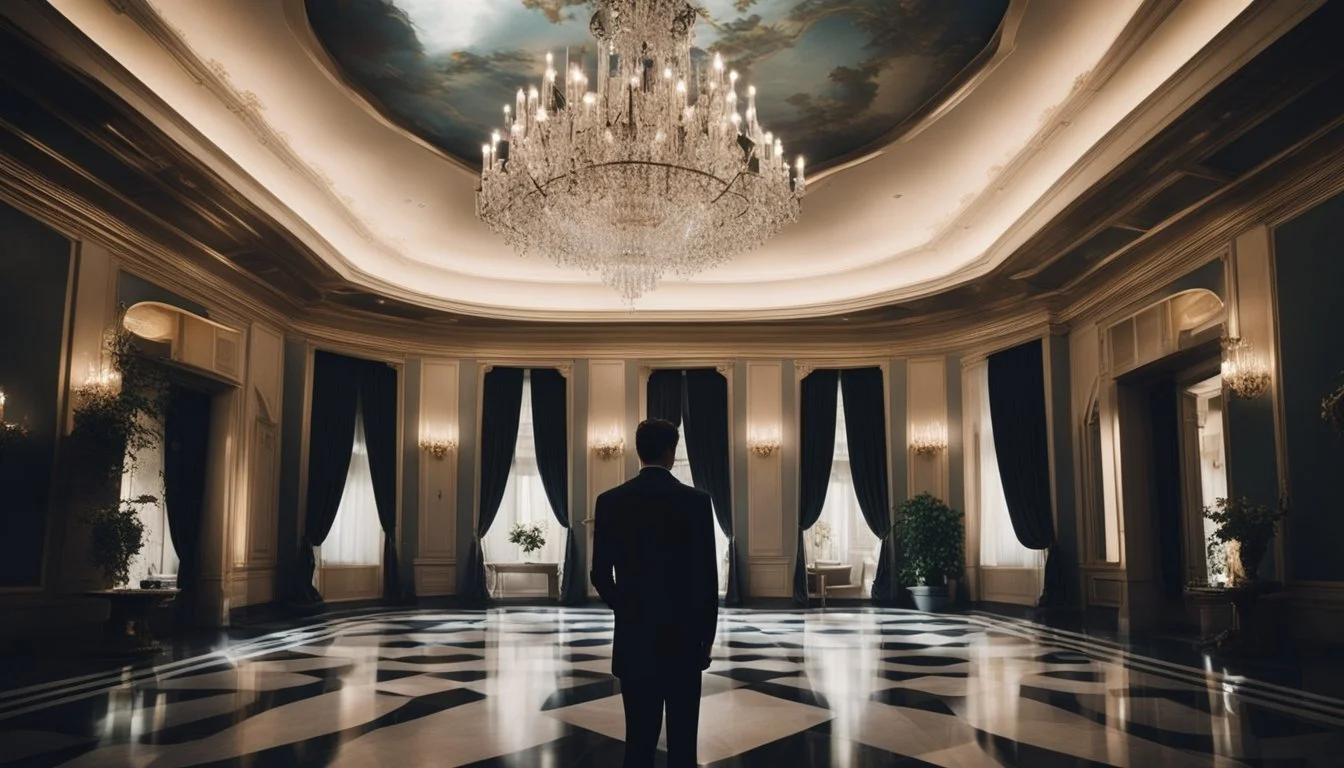10 Riveting True Crime Documentaries About High Society
Exploring the Secrets of the Elite
True crime documentaries have garnered widespread interest for their insightful depictions of high-stakes investigations and intricate human behavior. Within the genre of true crime, stories that unravel crimes connected to high society hold a particular fascination, blending elements of luxury, power, and often shocking illicit activities.
For those intrigued by the collision of wealth and transgression, these documentaries offer a compelling window into worlds where the stakes are immense and the fall from grace can be spectacular. Viewers are drawn to the duality of glamorous lifestyles intertwined with dark secrets, making these tales not just engrossing, but also thought-provoking.
1) The Staircase (2004)
"The Staircase" is a gripping true crime documentary that delves into the legal battles and personal turmoil surrounding Michael Peterson, an author accused of murdering his wife, Kathleen Peterson, in 2001. Filmmaker Jean-Xavier de Lestrade meticulously covers the trial, presenting a multidimensional view of the case.
Lestrade's documentary spans multiple episodes, providing a detailed look at the defense strategy and evidence presented. Viewers gain insight into Peterson's family dynamics and their reactions to the unfolding drama.
The film explores themes of media influence and judicial processes, making it a compelling watch for those interested in the complexities of high-profile criminal cases.
For more information, visit IMDb.
2) The Jinx: The Life and Deaths of Robert Durst (2015)
The Jinx: The Life and Deaths of Robert Durst is an American true crime documentary series directed by Andrew Jarecki. It premiered on HBO on February 8, 2015. The series explores the dark and complicated life of Robert Durst, a real estate heir from New York.
The documentary quickly gripped audiences with its exploration of Durst’s involvement in several unsolved crimes. Through six episodes, it delves into the mysterious disappearances of his wife, Kathleen McCormack, in 1982, the murder of his friend Susan Berman in 2000, and the death of his neighbor Morris Black in 2001.
The Jinx gained critical acclaim for its compelling narrative and the groundbreaking evidence uncovered during filming. It features extensive interviews with Durst himself, providing a rare glimpse into his psyche.
The series is notable for revealing previously hidden material, including prison calls and interviews with new witnesses. It concluded in dramatic fashion with Durst’s shocking on-camera admission, which led to renewed legal scrutiny.
For more information, visit The Jinx: The Life and Deaths of Robert Durst on IMDb.
3) Wild Wild Country (2018)
"Wild Wild Country" is a six-part Netflix documentary series by Chapman and MacLain Way. It explores the controversial figure of Bhagwan Shree Rajneesh and his movement, known as the Rajneeshpuram community, established in rural Oregon during the early 1980s.
The series delves into the complex dynamics between the Rajneesh followers and the local residents. Conflicts erupted over land use, legal battles, and cultural differences, capturing the attention of national media.
A key figure in this story is Ma Anand Sheela, Rajneesh’s secretary. Sheela’s bold and aggressive tactics played a significant role in the escalating tensions and legal troubles faced by the community.
The documentary sheds light on themes of power, spirituality, and the lengths to which a group will go to protect its beliefs. Archival footage and interviews with former members provide a gripping portrayal of this true crime story.
For more detailed information, visit the Wikipedia page.
4) Evil Genius: The True Story of America's Most Diabolical Bank Heist (2018)
"Evil Genius: The True Story of America's Most Diabolical Bank Heist" is a gripping true crime documentary released on Netflix in 2018. It covers the infamous 2003 "pizza bomber" case in Erie, Pennsylvania. This bizarre incident captured national attention due to its complex and macabre nature.
The series is directed by Barbara Schroeder and Trey Borzillieri. It explores the events leading up to the death of Brian Wells, a pizza delivery driver who was forced to rob a bank with a bomb collar strapped to his neck.
Through four parts, the documentary delves into the FBI investigation and unravels a twisted tale involving multiple suspects and shocking revelations. The narrative provides a detailed look at the crime and its aftermath, keeping viewers on the edge of their seats.
For a deeper dive into this strange case, more information can be found on IMDb or Wikipedia.
5) The Assassination of Gianni Versace: American Crime Story (2018)
This limited series is the second installment of FX's critically acclaimed "American Crime Story." It covers the shocking murder of the iconic fashion designer Gianni Versace.
Set in July 1997, the series explores the events leading up to Versace's murder by Andrew Cunanan, a spree killer with a complex and troubling background.
Starring Edgar Ramírez as Versace, Darren Criss as Cunanan, Ricky Martin, and Penélope Cruz, the series provides a deep dive into the lives of its characters.
The production, helmed by Ryan Murphy and a team of accomplished producers, is based on Maureen Orth’s book "Vulgar Favors."
Through meticulous attention to detail, the show combines real-life drama with high-stakes tension, making it a must-watch for true crime enthusiasts.
Find more information about The Assassination of Gianni Versace: American Crime Story (2018).
6) McMillion$ (2020)
McMillion$ is a captivating documentary miniseries that delves into the intriguing McDonald’s Monopoly promotion scam. This high-stakes fraud, which unraveled between 1989 and 2001, was orchestrated by Jerry Jacobson.
Jacobson, the head of security for the agency managing the promotion, masterminded a scheme that siphoned $24 million from McDonald’s iconic game.
The series highlights how Jacobson recruited a diverse group of accomplices to assist in the operation. These accomplices, ranging from friends to distant relatives, were integral in distributing the winning game pieces without drawing suspicion.
Directed by James Lee Hernandez and Brian Lazarte, the six-part HBO series is notable for its meticulous attention to detail and gripping narrative style. It provides a thorough examination of the criminal web spun by Jacobson and his network.
McMillion$ offers viewers a detailed, often startling look at how one man exploited his position to undermine a major corporation's promotion.
For more information, visit the Wikipedia page.
7) The Act (2019)
"The Act" (2019) is a chilling true crime docudrama that delves into the disturbing case of Gypsy Rose Blanchard and her mother, Dee Dee Blanchard.
This series portrays the extreme case of Munchausen syndrome by proxy experienced by Gypsy. Her mother, Dee Dee, subjected her to unnecessary medical treatments and made her pretend to be severely ill for years.
Through a blend of dramatized scenes and investigative insights, "The Act" showcases how Gypsy's desperation led her to orchestrate her mother's murder. The series digs deep into the psychological manipulation and abuse experienced by Gypsy.
With gripping performances and a narrative that brings light to a little-known psychological disorder, "The Act" captivates its audience.
For more details on this series, you can visit its IMDb page.
8) Dirty John (2018)
"Dirty John" is a captivating true crime documentary series that delves into the sinister activities of John Meehan. Focusing on Meehan's involvement with Debra Newell, this series unravels the deceit, manipulation, and danger that ensued.
John Meehan, a conman and sociopath, managed to exploit several women using his charm and cunning. The series demonstrates how Meehan's predatory nature impacted the lives of his victims.
With gripping interviews and detailed reenactments, "Dirty John" provides an emotional and thrilling recount of the events. It showcases how one individual's malevolence can infiltrate and destroy the lives of others.
The series is based on the true story originally published by the Los Angeles Times and later adapted into a podcast. This multilayered adaptation has drawn praise for its authenticity and engaging storytelling.
"Dirty John" highlights the importance of awareness in relationships, especially when dealing with deceptive individuals. It serves as a cautionary tale about the hazards of ignoring red flags in personal interactions.
For more information on the film, visit IMDb.
9) Operation Varsity Blues: The College Admissions Scandal (2021)
"Operation Varsity Blues: The College Admissions Scandal" takes viewers inside the infamous 2019 college admissions bribery scandal. Directed by Chris Smith, the documentary sheds light on how wealthy families manipulated the admission processes at prestigious universities.
The film features reenactments and interviews to reveal the operations led by Rick Singer, the mastermind behind the scam. Through fake athletic profiles and altered test scores, he guaranteed privileged students spots at top colleges.
The documentary also highlights the broader issues of inequality in the education system. It questions the integrity of college admissions and the lengths some parents will go to secure their children's future.
For more information on this documentary, visit IMDb.
10) The Bling Ring (2022)
The Bling Ring, featured in "The Real Bling Ring: Hollywood Heist" on Netflix, delves into a shocking 2008-2009 crime spree by a group of teenagers in Los Angeles.
This group, infamously known as the Bling Ring, broke into the homes of numerous celebrities, including Paris Hilton, Lindsay Lohan, and Orlando Bloom. Their audacious heists captured the attention of media outlets nationwide.
The documentary provides firsthand accounts from the burglars themselves. Notably, Nick Prugo and Alexis Neiers, known from the show "Pretty Wild," recount their involvement and subsequent fame.
By exploring their motivations and the media frenzy that followed, the series provides a chilling look into the allure of celebrity culture and the lengths some will go to achieve a taste of it.
Fans of true crime documentaries will find "The Real Bling Ring: Hollywood Heist" both fascinating and unsettling.
For more information about "The Real Bling Ring: Hollywood Heist," visit IMDb.
Historical Context
True crime documentaries have significantly evolved over time, reflecting societal changes and the public's growing fascination with high-profile crimes involving elite circles. Examining these aspects provides a deeper understanding of the genre's development and its focus on high society.
Evolution of True Crime Documentaries
True crime documentaries began gaining traction in the mid-20th century.
Early works like The Thin Blue Line (1988) by Errol Morris pioneered the use of reenactments and investigative journalism to challenge official narratives. This documentary spotlighted wrongful convictions and influenced the legal system.
Technological advancements in the 21st century allowed filmmakers to utilize high-quality footage, expert interviews, and multimedia resources, increasing the genre’s production value. Streaming services like Netflix and HBO further revolutionized the availability and popularity of true crime content, transforming it into a mainstream phenomenon.
High Society in True Crime History
High society's involvement in true crime presents a compelling dynamic between wealth, power, and justice. Crimes involving affluent individuals or renowned families often attract significant media attention due to their sensational nature and the paradox of privilege intersecting with criminality.
Documentaries like Cocaine Cowboys: The Kings of Miami (2021) exemplify the opulent yet perilous lifestyles of high-profile criminals. These stories often reveal underlying societal issues, such as corruption and inequality, highlighting how social status can both protect and implicate individuals in criminal activities.
By delving into these narratives, true crime documentaries offer a unique lens through which viewers can explore the darker facets of high society, fostering a critical analysis of power structures and the complexities of justice.
Analyzing Crime in Elite Circles
True crime documentaries often highlight the complexities of criminal behavior among society’s upper echelons. These stories delve into the psychological motivations of perpetrators and the broader economic and social effects of their actions.
Psychological Profiles
Individuals involved in high society crime often exhibit unique psychological traits. They may possess an acute sense of entitlement and superiority. Narcissism and sociopathy are common, enabling them to manipulate and deceive others.
Their backgrounds typically include wealth and privilege, shaping their risk-taking behavior. These traits help them rationalize illegal activities. Understanding these psychological profiles provides insight into their actions, showcasing how deep-seated issues drive their crimes.
Economic and Social Implications
Crimes committed within elite circles can have profound economic and social consequences. Financial fraud, for instance, can destabilize markets and erode public trust in institutions.
The social impact is equally significant. High-profile cases can lead to increased scrutiny and regulation. The fallout affects not only the perpetrators but also their families and communities. Examining these implications reveals the far-reaching effects of crime in elite circles.
Impact on Public Perception
True crime documentaries on high society have the ability to shape public opinion through media representation and can even influence legal outcomes. These documentaries provide a lens through which viewers scrutinize justice and the behavior of societal elites.
Media Influence
True crime documentaries serve as a powerful tool in shaping public perception. By bringing hidden stories of high society crimes to light, these films challenge the image of untouchable elites.
Television and streaming platforms amplify these narratives, reaching vast audiences. As a result, viewers gain insight into the complexities of criminal behavior among the wealthy and powerful.
Examples such as "The Jinx" and "American Crime Story" reveal the discrepancies in how justice is served for influential individuals compared to ordinary citizens. This media exposure often fuels discussions on privilege and accountability.
Changes in Legal Outcomes
Documentaries can directly impact legal proceedings by raising public awareness and influencing judicial action. They can bring new evidence or perspectives that may lead to re-evaluation of cases.
For instance, "Making a Murderer" and "The Staircase" have prompted calls for re-investigation and review of legal decisions. Public pressure, driven by these documentaries, can lead to re-opened cases and even exonerations.
Increased scrutiny from these films often results in broader debates about the fairness and efficacy of the legal system. High-profile cases depicted in documentaries can lead to tangible legal reforms and changes in investigative practices.











